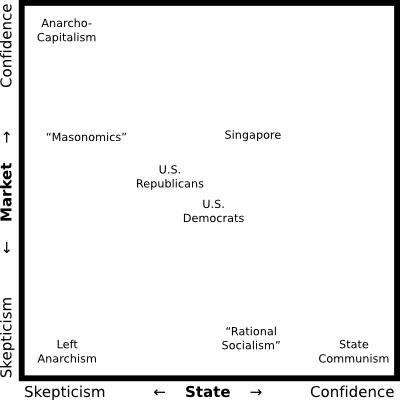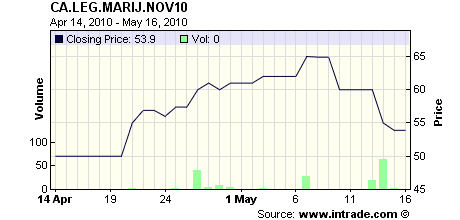I don’t know a whole lot about Bitcoin, but from what I’ve heard (a) governments, unable to fight math, will soon crumble, or (b) Bitcoin is nothing more than a scam meant to enrich its inventor and early adopters and increase the gap between haves and have-nots, or (c) both.
I’d guess none of the above. If Bitcoin speculation, increased acceptance of Bitcoin for real goods, or both continue apace such that the Bitcoin phenom grows for a long period of time (all questionable), I predict that governments and any other entity with a large measure of control over how it can demand payment will launch their own cryptocurrencies, seeking endowments for themselves much as Bitcoin’s inventor and early adopters may have gained.
First a quick aside on the welfare and distributional effects of an endowment for cryptocurrency initiators, and Bitcoin’s in particular. It doesn’t matter all that much, at least in theory:* with zero transaction costs (perhaps cryptocurrencies will get us closer to that ideal) resources will be put to their most efficient uses, regardless of initial distribution. Of course reality will diverge from perfect theory, but given gross inefficiencies that exist in the world today, it’s hard to say that whatever change could be engendered by Bitcoin taking off would certainly be worse. Regarding distributional effects (i.e., equality), it’s hard to see how at least in the short term potentially massive wealth for the Bitcoin inventor and early adopters changes much. It is doubtful these people are among the pre-Bitcoin megarich. Scam or not, I don’t see how Bitcoin distribution increases or decreases inequality significantly unless one expects Bitcoin to become the only currency in the world. I consider this highly unlikely.
Because, repeating close of first paragraph: once Bitcoin is considered as tested and important, any entity that can would be crazy to not seek a windfall for itself by initiating a new cryptocurrency with rules such that it can gain a significant fraction of the wealth embodied in the currency for itself, as the Bitcoin developer and early adopters supposedly have. A significantly powerful entity (i.e., a government) would be significantly tempted to initiate new cryptocurrencies regularly, just as the temptation holds to inflate traditional fiat currencies now. These entities, and many others besides, will also want to experiment with cryptocurrency rules (e.g., Bitcoin’s decreasing minting to a set limit, constant growth, other?).
I have no idea how any of this will play out. On one hand, what are the competitive pressures that will drive cryptocurrency evolution? Is it conceivable that network effects could result in only one cryptocurrency holding value, perhaps Bitcoin? On the other hand, if cryptocurrencies become economically important, they will surely have deep and far reaching effects, even if those don’t include the sudden collapse of governments and the rise of a Bitcoin oligarchy. It seems well worth thinking ahead about these effects from a variety of perspectives: one example.
Also recommended: Bitcoin, what took ye so long? on strands of thought preceding Bitcoin, by Nick Szabo. Indeed, go read everything Szabo has written.
I understand that emotions run high concerning Bitcoin. “Race to the bottom” in the title of this post is merely intended to provoke. The phrase is often abused. Feel free to disabuse me of any incorrect thoughts.
Oh, and feel free to send ฿ to 153ofsZ1PrnCnDGjvWAenRJc53TRhR9BzK.☻





